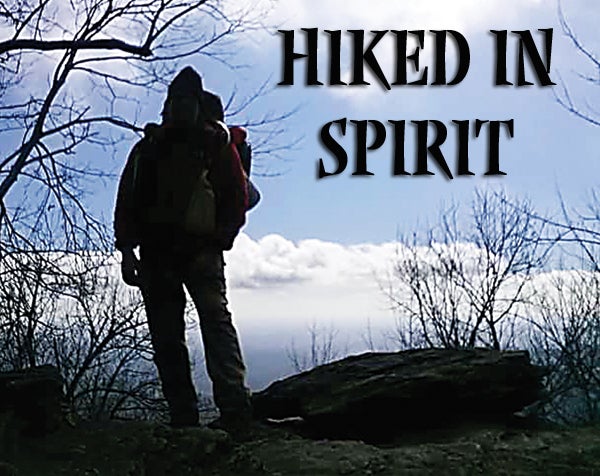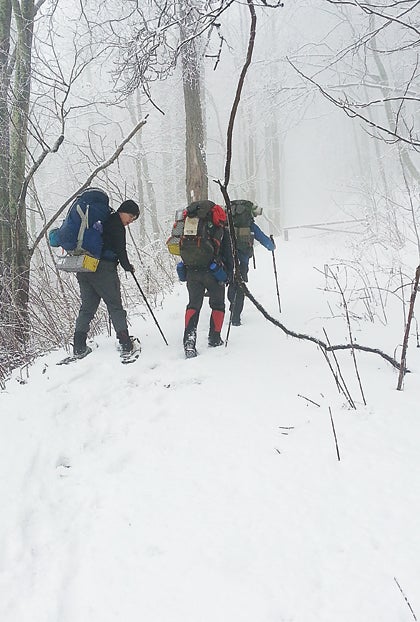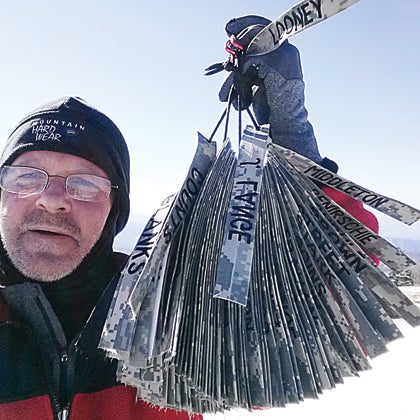Hiked in Spirit: Veteran honors soldiers while hiking Appalachian Trail
Published 8:41 am Friday, February 26, 2016

Contributed Photo
By carrying the names of 216 soldiers that were defeated by PTSD, Eshleman makes a statement to those that are still fighting that battle every day, “You are never alone — never have been and never will be.”
Carrying 216 names tags weighing one pound, retired Army Sgt. George Eshleman is making it possible for soldiers that took their lives after battling post traumatic stress disorder to hike the Appalachian Trail in spirit.
Eshleman originally planned to hike it with his friend Shannon, with whom he served in Kuwait during Desert Storm, but before they were scheduled to leave, Shannon committed suicide in April 2015. Hiking helped them to relax and remember the camaraderie that veterans share, and they wanted to get other vets on the trail.
Following the devastating loss of his friend, Eshleman began the trail in September, but hyperextended his knee only three days into the trek on Mt. Katahdin. He attempted to “walk it off” for 68 more miles, but had to fly home to Georgia once he was already 40 miles into Maine’s 100-Mile Wilderness. After adequate recovery, he is back on the trail, and passed through Hampton on Wednesday. He made a stop in Elizabethton to visit with his friend, Navy veteran Shane Robinson, and to make a stop at the Elizabethton Star.
Upon arrival in Elizabethton, he had 418 miles behind him in 41 days and 1,771 miles remaining. He has trudged through feet of snow in below-freezing temperatures along mountain ridges and through valleys, and he welcomes any interested veterans to join.
The mission of this trek is to bring awareness to the thousands of American veterans attempting to combat PTSD alone everyday, and to the ones that have given up on that battle. To reduce the number of 22 American vets that commit suicide daily, Eshleman, Robinson and veterans from a total of seven states have banded together to form the non-profit Unified Warrior Foundation, which provides free recreational activities for veterans and reconnects them with the support they once relied on during active duty.

Contributed Photo
Eshleman encountered these three veterans along the trail and said he has met others as well. Earl Shaffer, a World War II veteran, was the first to thru-hike the entire trail from Georgia to Maine in 1948. He left a legacy for hundreds of veterans who have similarly completed the trail.
The organization is now networked with over 30 partner agencies. Eshleman said this network will make it possible to provide recreation, housing, counseling, job training and a variety of other services to veterans suffering from PTSD and other service-related injuries.
When soldiers were in the military, they had a chain of command and support on which they relied, and which was effective at solving problems, Eshleman explained.
“When they get out, they don’t have that,” he said. “They’re searching for it. They’re trying to find help and programs they can get into, and they’re being turned away, not only by foundations, but by the government and the V.A.”
This feeling of isolation and confusion, combined with the crippling psychological effects of PTSD can keep vets from leaving their homes and from interacting with loved ones. For many, it leads to suicide.
Eshleman, Robinson Dorsey, and their partner agencies are striving to redefine PTSD: Perseverance Tenacity Strength Determination.

Contributed Photo George Eshleman stands atop Round Bald with 216 names of veterans that have taken their own lives after battling PTSD. These names, weighing one pound, represent only ten days worth of veteran suicides in the United States resulting from PTSD.
“The only help they’re going to get is through other veterans helping each other,” Eshleman said, so that is what they are offering.
In fact, this is exactly how the foundation came together. Robinson reached out to Eshleman after seeing a post on Facebook describing Eshleman’s anticipated thru-hike of the AT. The two realized soon after that they had actually served in the same area from 1989-1995, but had never met. They are now close friends and sit on the executive board of the foundation along with Army veteran Chris Dorsey.
The goal of the foundation is not only to help each other, but to see each veteran evolve into a support mechanism for other soldiers, just as Robinson and Eshleman have become for one another.
When Eshleman completes the trail, he will have the names he carried framed and returned to their families with a caption reading “Hiked the Appalachian Trail in Spirit.”
To join him on the trail or to send the name of a veteran, contact Eshleman via private message on the Unified Warrior Foundation Facebook page. Eshleman said they will be hosting fundraiser events and that in the meantime, they appreciate any donations to help acquire gear needed to outfit soldiers on section and thru-hikes in the future. He and Robinson wanted to give special thanks to Adam and Renee Mullins of Mullins Chrysler Dodge Jeep Ram who made a monetary donation to the foundation. Additionally, gear and information is available on the foundation website.




